- Home
- Amy Harmon
The Bird and the Sword Page 3
The Bird and the Sword Read online
Page 3
The keep itself was like a small city—two forges, a butcher, a mill, an apothecary, a printer, a clothier, bakers and weavers and makers and healers—all of the very un-magical sort. Skills were acceptable. Mystical gifts were not. Everyone was quick to show how staid and useful they were, and as a result, my only desire as I grew was to be valuable too.
I was never taught to read or write. My father wouldn’t allow it. He was afraid to give me words, in any form, and because I couldn’t speak, people often forgot that I still understood, and they talked freely in front of me. I learned a great deal that way, listening and watching. I had spent time with the old women of our keep, women who’d never been to school but who were educated in hundreds of other ways. From them I learned to heal with herbs and soothe with my touch. I learned wisdom and wariness, and I learned to patiently accept and quietly wait. For what, I wasn’t sure, but in my heart I was always waiting, as if the hour my mother spoke of would someday arrive.
“We thought you’d been carried away by a birdman!” Bethe shrieked as Boojohni and I entered the kitchens from the rear of the keep, my hood still high, my eyes averted. I sighed. I had hoped I would make it up the back stairs without anyone seeing me, but Madame Pattersley, the housekeeper, and my maid had clearly been watching for us.
“What would one of the Volgar want with little Lark, eh?” Boojohni huffed. “She’s on the scrawny side. He’d need to carry you off too, Bethe. But that would be a bit difficult.” Boojohni winked and slapped Bethe on her very ample behind. She swatted back at him and forgot about me completely, which was what Boojohni intended, but I didn’t get by my father’s housekeeper quite as easily. She swooped in and jerked the hood from my head. She gasped at the sight of my hair.
“Milady! Where have you been?”
Not being able to answer was a relief, and I shrugged and began unwrapping my hair from around my head, releasing the twigs and leaves caught in the coils.
“You’ve been with a man!” Bethe squealed. “You’ve spent the night in the woods with a man.”
“She did no such thing,” Boojohni growled, offended. I patted his head, gratefully.
“Your father will have to be told, Lark. You know how he worries. I can’t keep this from him,” Madame Pattersley said righteously. Madame Pattersley had spent the fifteen years since my mother’s death trying to win my father’s affections. We were alike in that regard, though I’d given up years ago. She told him everything. Maybe that made up for the fact that I could tell him nothing.
“Keep what from me?” My father stood in the doorway.
“Lark was out all night, milord,” Madame Pattersley declared, her proclamation bouncing off the pots and pans hanging overhead, her glee echoing the din.
I raised my eyes to my father, willing him to look back at me, but he looked at Boojohni instead. I could see myself in the grey of his eyes and the fine bones of his face. He was elegant without being feminine, tall without being gangly, thin without being gaunt. But he was also shrewd instead of wise, mannerly instead of kind, and ambitious instead of strong.
“I hold you all responsible,” my father said quietly. “She must be watched at all times. You know this.”
The women dropped deep curtsies and Boojohni bowed, but I could feel his empathy. It permeated the space between us. My father turned and left the kitchen without another word.
The chattering squirrels didn’t like our presence. They wanted us to leave. A snake coiled in the bush to my left, and I felt him taste the air. His life force pulsed, emitting the word enemy and then wait. It wouldn’t strike, but it was poised and watching. A toad belched to my right, completely unconcerned with the company. He hardly noticed us at all, and he felt no fear. He belched again, reminding me of my father slumped against the dinner table, the dogs at his feet, waiting for him to leave the table so they could fight over what he left behind. Whispers and clicks and buzzes and hums, slithering across the forest floor and sliding up my skin and into my head. Sound everywhere, yet my companion didn’t seem to notice it.
I dismissed the babbling creatures the way they dismissed me and began filling my apron with the sweet berries hidden by the brambles. A bee fled with one goal in mind. Home. Home. Then he was gone. It had been three days since I’d discovered the wounded eagle in the woods. I’d come back every day, as if I would find him again, or he would find me. Or maybe I thought I would find the archer who brought him down and break his arrows one by one. It was not against the law to hunt, and I did not judge a man for feeding his family from the forest, but I was filled with helpless fury when I thought of the eagle. My agitation must have shown.
“You’ll prick your fingers, Milady.” I raised my eyes and met Lohdi’s gaze. Boojohni had been needed elsewhere, and young Lohdi—a clumsy youth of sixteen who couldn’t hold his tongue for five seconds—had been assigned to shadow me. I preferred my own company but was rarely given that option, and it was beyond infuriating. I lifted a shoulder, dismissing his concern.
“Your father said I can’t let you harm yourself.”
I ignored him with clenched teeth and kept picking. I had almost twenty-one summers. Most women my age had several children of their own, and I did not need a nursemaid, especially one younger and decidedly less capable than I.
Lohdi shifted nervously and looked at the skies, as if the patches of blue we could make out above the trees would soon turn to stormy grey.
“We need to go. They will be here soon.”
I raised my gaze from the berry bush once more, questioning him.
“Your father didn’t tell you?” Lohdi asked in surprise.
I shook my head. No. My father didn’t tell me anything. He didn’t talk to me because I couldn’t answer him.
“He is expecting visitors. Important men. Maybe even the king.”
I stiffened, the news making me drop my skirts and lose the berries I was collecting in my shawl. My stomach clenched painfully as Lohdi chattered on in excitement. If the king was coming, I didn’t want to be caught in the woods. I wanted to be safely away, tucked in my mother’s old tower room where he couldn’t find me. Or harm me.
I started immediately for home, Lohdi falling into step behind me, expressing gratitude for my hasty return. When we heard the pounding hooves we started to run, Lohdi in anticipation, me in terror. I flew through the trees, skirts in hand, my hair streaming behind me. My maid complained that my hair was like corn silk. She couldn’t get it to curl or stay or conform to the exotic shapes and styles that were fashionable among the women of Jeru, and I’d stopped trying to tame it, brushing it and leaving it loose more often than not.
“Milady! Stop!” I heard Lohdi call out behind me, but it wasn’t my fault he was slow. I was many things, but slow wasn’t one of them, and I picked up speed, hearing the thundering of the horses and feeling the energy in the air. I broke out of the trees seconds before two dozen riders came over the rise from the nearest village, flags waving and bugles screaming. Green and gold, the colors of the kingdom, adorned each horse and every rider. They were almost upon me, and I stared in horror as they slowed reluctantly, the horses resisting their reins, their eagerness to run, run, run, coming off them in waves. Horses had very few words. Run. Eat. Home. Fear.
But I was the only one afraid now, because I was too late.
I stepped back, intending to turn and run back into the forest and hide in the shadows until the king’s party left, even if it drew my father’s ire, but at that moment, Lohdi barreled out from the dense tree line onto the hard-packed road, and collided with my back. I fell to my hands and knees directly in the path of the procession. I heard several horses whinny in panic, stomping and sidestepping, and someone cried out. I felt a foot in my back, and I fell to my stomach on the hard-packed dirt. I realized Lohdi hadn’t just knocked me down, he was trampling me.
“Halt!” someone roared, and I scrambled to my feet, narrowly avoiding a rearing, sweating stallion with bared teeth.
&
nbsp; Lohdi cried out as he also tried to rise. I reached to assist him, not wanting to see him harmed, though at that moment I could have killed him myself. Someone beat me to it, catching the back of his shirt and hauling him to his feet. The King had dismounted, and he stood towering above the wriggling Lohdi.
“King Tiras,” Lohdi gasped and fell back to his knees in subservience before being yanked to his feet again.
“Stand up, lad,” he commanded.
“Yes, Majesty! So sorry, Your Highness.” Lohdi bobbed and genuflected. The king released his arm and turned to me, pinning me with eyes so dark they appeared black in a face that was arresting rather than beautiful, formidable rather than cold. Warm skin covered sharp edges and well-formed features, and I was certain he was accustomed to bows and obeisance though I gave him neither.
His hair was completely white against his bronzed skin, like a man well on in years, though he couldn’t yet be thirty summers. His hair had been black when I’d last seen him, but he looked very little like the boy I remembered, and I was certain he didn’t remember me. I’d been five years old when my mother was brought down by his father’s sword. He’d been older than I, but I doubted that day had made the same kind of impression on him as it had on me.
“Are you injured?” he asked. I wondered if I looked as disheveled as I felt. My hair was a wild tangle and my face felt flushed. My palms stung and my skirt was torn, but I didn’t allow myself to smooth my tresses or straighten my clothing. I didn’t care about his opinion and stared back at him stonily.
“She doesn’t talk. She’s a mute,” Lohdi rushed to explain. His eyes shot sideways in apology. “Sorry, Milady.”
“Milady?” the king questioned, his eyes still on me. I held his gaze without expression.
“Lord Corvyn’s daughter, Your Majesty,” Lohdi rushed to explain.
King Tiras shared a weighted look with the man to his left—a dark-haired, broad-shouldered warrior in the king’s coat of arms who had also dismounted—then returned his attention to me.
“So if I ask you if your father awaits, you won’t be able to answer?” he asked me, though it didn’t sound like a question.
“She’s not stupid, Your Highness. She understands pretty well. She just can’t talk,” Lohdi provided. I wished he would shut up. I did not require an interpreter.
“I see,” the king inclined his head, still taking my measure. “Lead the way then, Milady. I have business with your father.” He mounted his horse smoothly as I turned to obey.
I should not have given him my back. It was foolish. But King Tiras had given me no warning of what he intended. I was suddenly swooped off my feet and settled in front of him on his enormous horse. I arched my body in alarm and swung an elbow back, connecting with his breastplate. I only succeeded in hurting myself. His arm simply tightened around my body until I could barely draw breath.
“You will sit here during negotiations. If your father doesn’t want to see you harmed—if you don’t want to be harmed—you will both cooperate. I would rather not tie you up and drag you behind my horse. But I will. Be still.” His voice was harsh in my ear, his hair tickling my face, and I did as he commanded. I wondered if he could see my pulse pounding in my throat. Lohdi stood, gaping at the sudden turn of events. His eyes clung to the king, and his face was a horrified mask.
“Tell your master the king is here, boy,” the man named Kjell demanded, and Lohdi was off like a shot, stumbling again amidst the laughter of the guard who followed in a protective formation around their king. My father would be alarmed that I’d been taken hostage, but not for the reason the king hoped.
Someone had already alerted my father and the rest of the keep that the king’s procession was en route, and he stood in the courtyard amongst a growing group of onlookers, a striking figure in the colors of his keep—brilliant blue and silver. He’d assembled a small group of his guard, but none of them were foolish enough to draw their swords. This was the king after all, and if the king wanted to take the daughter of a nobleman in his own kingdom, no one would stop him. They looked more stunned than anything, their eyes lingering on me in confusion. I was not exactly a prize.
“Corvyn,” King Tiras greeted coldly. His words stirred my hair and made the flesh rise on my neck. He disliked my father. His disdain was a frigid breeze, and it made me wince and long to wiggle free. I was clearly broadcasting my distress, and the king’s horse whinnied and danced at my discomfort. I bade it be still, a hand in his mane, and he seemed to understand.
“King Tiras. What is the meaning of this?” My father’s voice was surprisingly firm. He didn’t look at me.
“Your loyalty has come into question, Corvyn. Your men never arrived at Kilmorda. Lord Bin Dar sent three hundred men. Lord Gaul sent two hundred men. Lord Janda sent at least that many. I received men from every province and every region. Thousands of men from all over my kingdom were sent to respond to the attack on our northern border. But no men ever arrived from Corvyn.” King Tiras’s voice was curious. Conversational. I shivered against him, completely unconvinced. His arm tightened.
“I sent men, Your Highness. Hundreds of men,” my father stammered. The lie made a yellow halo around my father’s neck, a noose of his own making.
“Be very careful, Corvyn,” King Tiras warned softly, and he pressed his gloved hand to my chest. “Your daughter’s heart is pounding beneath my fist. She knows you lie. I know you lie.”
“She knows nothing. She is . . . simple. Like a child. She has not spoken a single word since her mother was murdered before her eyes. Your father killed my wife. Will you now kill my daughter too?”
I felt the king stiffen at my back, and I knew he remembered her. I could feel her name in his mind, Meshara. Her name winked out like he’d flung it away. There then gone.
Suddenly, Boojohni pushed through the crowd, shoving people aside, tunneling through legs and skirts. My heart rose to my throat as he fell to his knees on the cobblestones in front of the king.
“I am the servant of the lady, Your Majesty,” he cried, breathless. “Please! Don’t harm her. Take me instead.”
Laughter rose up among the king’s guard, and I shook my head adamantly. Boojohni growled at my denial and repeated his request.
“Take me instead!”
“Why?” the king asked, his eyes on Boojohni. “Why should I take you?”
“I have no loyalty to Lord Corvyn. My loyalty is to her. Only to her.”
“Your loyalty should be to your king, Troll,” Kjell barked, and Boojohni touched his forehead to the dirt in total surrender.
“I am at His Majesty’s service,” he said humbly. I felt tears prick my eyes. His fear for me was palpable, and my love for him had me shaking my head once more.
“The lady does not want you to do this,” the king said, taking note of my refusal.
“The lady is more concerned for me than she is for herself,” Boojohni rejoined.
“You hold no value to me, Troll, though I admire your courage,” King Tiras replied, then added, “I remember you.” I felt my mother’s name flicker in the air again, a whisper from the king’s thoughts that only I could hear. I wanted to hate him for it, but instead it gave me hope.
Boojohni’s eyes found mine, and his expression was desperate.
“Then let me come with her. Take me too,” he implored.
The king was silent for a heartbeat, considering. “So be it,” he acquiesced suddenly, and called out to someone in the back of the procession.
“Jerick! The troll will ride with you.”
A warrior rode forward and pulled Boojohni up behind him. Boojohni looked equal parts relieved and distraught. He had never been able to ride without getting motion sickness. The trip did not bode well for my little friend. I predicted he would be running alongside the warrior before long.
“Your daughter will be returned when the enemy is defeated, Corvyn. But if I die, she dies.”
I almost laughed. How ironic. I was con
vinced if the king knew the curse my mother had lain on my father’s head, he would make me suffer terribly.
“None of this is necessary, Majesty,” my father protested weakly. “I give you my word.” He’d taken on a grey pallor, as though he believed his days were numbered.
“And I will take it, and your daughter,” the king replied smoothly. “Just so I am assured of your fealty.” He took up the reins and Kjell raised his arm, signaling their retreat.
“I left an army at the border of Kilmorda. We’ve beaten back the Volgar. For now. But I will expect you to send five hundred men to assist.”
“Five hundred?” my father gasped.
“You are welcome to send more. The sooner the Volgar are destroyed, the sooner your daughter returns to Corvyn. It is all up to you, Milord.”
We rode toward Jeru City for three hours at a steady pace, and I held myself stiff and straight, refusing to touch the man at my back. The bony ridge of the stallion’s spine was impossible to avoid, and though he seemed impervious to my weight, an occasional word escaped his master’s thoughts, letting me know he wasn’t entirely comfortable either. He yanked me against him once and barked that I was going to fall if I didn’t relax.
I gritted my teeth and held firm, ignoring the ache in my hips and the burning down my spine. If spite was the only weapon at my disposal, I would continue to wield it. Boojohni, just like I’d predicted, had grown ill after the first hour and pled to be let down. The man named Jerick had refused. We were moving too quickly, and Boojohni could not keep pace with the horses for miles on end. Boojohni had lost the contents of his stomach and was now moaning miserably from his perch. He’d been tied to Jerick to keep him from tumbling off when he vomited, and Jerick looked as peevish as I felt.

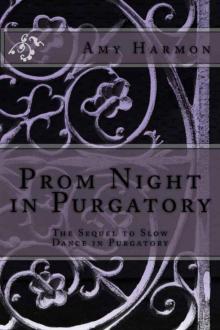 Prom Night in Purgatory
Prom Night in Purgatory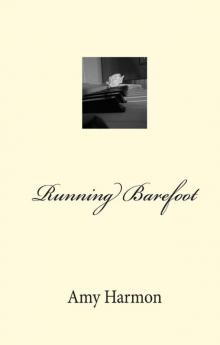 Running Barefoot
Running Barefoot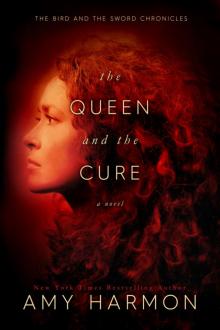 The Queen and the Cure
The Queen and the Cure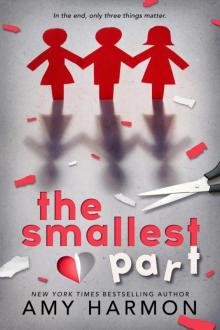 The Smallest Part
The Smallest Part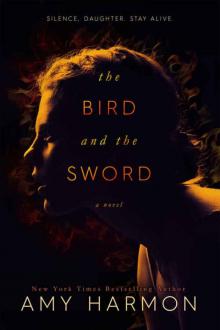 The Bird and the Sword
The Bird and the Sword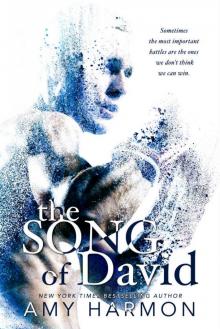 The Song of David
The Song of David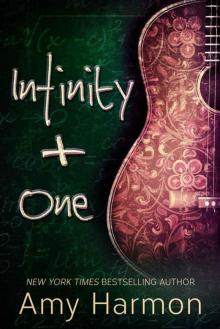 Infinity + One
Infinity + One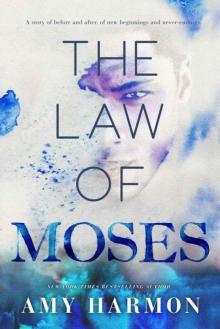 The Law of Moses
The Law of Moses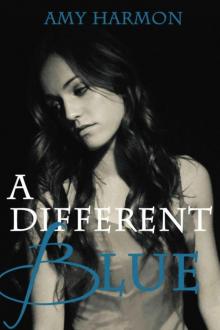 A Different Blue
A Different Blue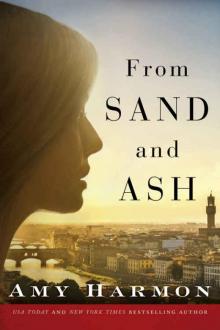 From Sand and Ash
From Sand and Ash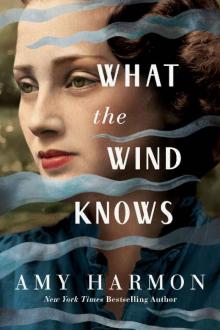 What the Wind Knows
What the Wind Knows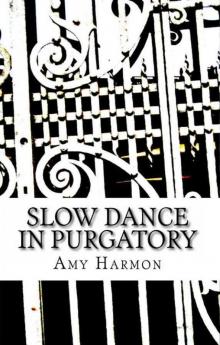 Slow Dance in Purgatory
Slow Dance in Purgatory Romance Through the Ages
Romance Through the Ages